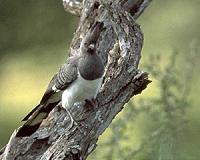| . |  |
. |
Bangkok (AFP) Oct 6, 2010 Wildlife researchers said Wednesday they had discovered 145 new species in the Greater Mekong region last year, including a fish with fangs and a seven-metre (23 feet) tall carnivorous plant. Other new finds include a frog that sounds like a cricket, Asia's only known bald songbird, and a "sucker fish", which uses its body to stick to rocks in fast flowing waters to move upstream, according to conservation group WWF. With fangs at the front of each jaw, the "dracula minnow" is one of the more bizarre new species found in 2009 in the Mekong River region, which comprises Cambodia, Laos, Myanmar, Thailand, Vietnam and China's Yunnan Province. Discovered in a small stream in Myanmar, it is largely translucent and measures up to 1.7 centimetres long. It is not yet known whether the species is endemic to a single ecosystem within Myanmar, or spread throughout the region as a whole. Other bizarre discoveries include the Bare-Faced Bulbul bird, which is bereft of feathers on the face and side of the head and has pale blue skin on the rear of the head and around the eyes. It lives in sparse forest on limestone karsts in central Laos. Among newly recorded plants, the Nepenthes bokorensis plant, found in southern Cambodia, has a climbing length of up to seven metres, with pitchers that trap ants and other insects for food. "The rate of discovery in the Mekong is almost without equal globally," WWF regional conservation director Stuart Chapman told AFP. "That's attributed to the enormous geographical and climatic range within the region, going from high altitude to dense tropical forests through to some of the richest freshwater in the world," he said. "Undoubtedly this region is one of the richest in terms of its biodiversity, but it's also one of the most threatened." The Greater Mekong region is home to some of the planet's most endangered wild species including tiger, Asian elephant, Mekong dolphin and Mekong giant catfish, said the World Wide Fund For Nature. WWF has warned the Mekong giant catfish -- one of the world's biggest freshwater fish -- could be driven to extinction if plans to build hydropower dams on Southeast Asia's longest river go ahead, blocking spawning grounds. "We need to keep one of the treasure troves of the world properly conserved," said Chapman.
Share This Article With Planet Earth
Related Links Darwin Today At TerraDaily.com
 Climate Change Forcing Move Or Lose Approach To Conservation
Climate Change Forcing Move Or Lose Approach To ConservationTempe AZ (SPX) Oct 06, 2010 What does it take to save a species in the 21st century? The specter of climate change, with predicted losses to biodiversity as high as 35 percent, has some scientists and managers considering taking their conservation strategies on the road. Managed relocation (MR) is literally the physical relocation of endangered or threatened species of plants and animals, by humans, to new, and forei ... read more |
|
| The content herein, unless otherwise known to be public domain, are Copyright 1995-2010 - SpaceDaily. AFP and UPI Wire Stories are copyright Agence France-Presse and United Press International. ESA Portal Reports are copyright European Space Agency. All NASA sourced material is public domain. Additional copyrights may apply in whole or part to other bona fide parties. Advertising does not imply endorsement,agreement or approval of any opinions, statements or information provided by SpaceDaily on any Web page published or hosted by SpaceDaily. Privacy Statement |